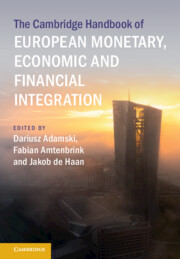Book contents
- The Cambridge Handbook of European Monetary, Economic and Financial Integration
- The Cambridge Handbook of European Monetary, Economic and Financial Integration
- Copyright page
- Contents
- Contributors
- Introduction
- Part I The Economic and Monetary Union
- 1 Conceptual Foundations of Economic and Monetary Union
- 2 Theorizing Economic and Monetary Union
- 3 Monetary Union and the Single Currency
- 4 On the Misalignment of Monetary, Economic, and Political Integration in European Economic and Monetary Union
- 5 Ideas, Interests, and Power
- 6 Coping with Economic Crises through Learning by Doing
- 7 The Political Economy of Reinsurance
- 8 Euro Crises, the Productivity Slowdown, and the EMU
- Part II The Monetary Dimension
- Part III The Economic and Fiscal Dimensions
- Part IV Financial Integration
- Index
- References
5 - Ideas, Interests, and Power
Germany’s Complex Balancing Act in the Process of Economic and Monetary Union in Europe
from Part I - The Economic and Monetary Union
Published online by Cambridge University Press: 28 September 2023
- The Cambridge Handbook of European Monetary, Economic and Financial Integration
- The Cambridge Handbook of European Monetary, Economic and Financial Integration
- Copyright page
- Contents
- Contributors
- Introduction
- Part I The Economic and Monetary Union
- 1 Conceptual Foundations of Economic and Monetary Union
- 2 Theorizing Economic and Monetary Union
- 3 Monetary Union and the Single Currency
- 4 On the Misalignment of Monetary, Economic, and Political Integration in European Economic and Monetary Union
- 5 Ideas, Interests, and Power
- 6 Coping with Economic Crises through Learning by Doing
- 7 The Political Economy of Reinsurance
- 8 Euro Crises, the Productivity Slowdown, and the EMU
- Part II The Monetary Dimension
- Part III The Economic and Fiscal Dimensions
- Part IV Financial Integration
- Index
- References
Summary
This chapter draws on extensive confidential elite interviews to examine the nature and uses of German power in EMU over time and to test the explanatory power of a distinctive German ordo-liberalism in the design and operation of the euro area. Its significance derives from the role of Germany as the biggest, systematically most significant net creditor power in the European Union. The chapter argues that, in using their power in EMU negotiations, German policymakers have sought to precariously balance two intertwined sets of interests and ideas in which they are differentially embedded. On the one hand, they face an inheritance of a striking cross-party consensus on Germany’s geo-political and foreign and security policy interests and of foreign policy ideas. On the other, they are embedded in a powerful structure of German economic interests and of economic policy ideas that are believed to best serve these interests. Within these strategic parameters, federal chancellors have characteristically sought to pursue tactical flexibility. The outcome has been a dynamic equilibrium in Germany’s role in EMU that has led to a euro area whose character is far removed from the kind of ‘economic constitution’ that had been sought by German ordo-liberals.
- Type
- Chapter
- Information
- Publisher: Cambridge University PressPrint publication year: 2023



